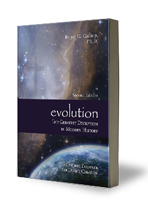Creation versus Evolution
Evolutionists believe the Big Bang created the universe out of nothing 10–40 billion years ago; our solar system was formed 5 billion years ago; single-celled organisms formed from an unknown primordial inorganic soup 3–4 billion years ago; multicellular organisms slowly evolved 1 billion years ago; humans evolved from lower life forms 185,000 to 2 million years ago; and modern civilization emerged within the last 5,000–6,000 years. Creationists believe the straightforward interpretation of Scripture—the earth and all living things were supernaturally created in six solar days by the God of the Bible about 6,000 years ago.
multicellular organisms slowly evolved 1 billion years ago; humans evolved from lower life forms 185,000 to 2 million years ago; and modern civilization emerged within the last 5,000–6,000 years. Creationists believe the straightforward interpretation of Scripture—the earth and all living things were supernaturally created in six solar days by the God of the Bible about 6,000 years ago.
Opinions about the origin of man, the earth, and the universe cannot be observed in the past or tested, and therefore cannot rely on empirical analysis(verification through repeated measurement and testing which is the basis for what is known as the "scientific method"). Rather, beliefs about the past are based primarily on present-day observations and interpretations. Empirical analysis is a wonderful testing tool but its application is limited to the present—the way things are and the way they work in the present. Empirical science can build jet airplanes, skyscrapers, and supercomputers, analyze the human body or the chemical consistency of rocks, but empirical science cannot deal directly with the past. When geologists or anthropologists have only the end results of an event, a full reconstruction of the one-time ancient event is based on certain assumptions about the past. For example, the reconstruction of rock formations and fossils—what happened in the unobserved past—is based on conjecture and the assumption of evolution.
The difference between scientific creation and evolution is not over observational and present-day empirical scientific data, but rather over interpretation of data—for example, interpretations of observed geological landforms (see section, Catastrophic Worldwide Flood). If one sets aside preconceived notions of old earth and evolutionary doctrine, the evidence in support of a Creator God is vastly overwhelming.
It is important to understand that evolution has never been observed in animal populations or proven by empirical science. (See section, Biological Scientific Evidence for Creation and section, Fossil Dating.) Secular scientists simply assume evolution and old age as their foundation or premise for reconstruction—evolution and an old earth are just assumed to be true. An individual fact is accepted or rejected as valid only if it fits the evolutionary model. The presumption of evolution exists in many science disciplines including biology, geology, astronomy, paleontology, and anthropology.
Secular scientists maintain that evolution is a legitimate 'science' and creation is a 'religion'. But ironically, most scientists agree that science is an organized body of knowledge in the form of 'testable' explanations or predictions (hypotheses) about the universe (all matter and energy) and theory is an explanation of a set of related observations or events based on hypotheses and verified multiple times by groups of independent researchers. Hypothesis is an educated guess based upon observation but has not been proved. At best, evolution is an unsubstantiated hypothesis. The bottom line, evolution does not meet the universally accepted definition of 'science' nor does it meet the definition of 'theory' or 'hypothesis'.
So why do scientists behave in such a manner—assume something is true when it cannot be proved and, in fact, it has never been observed? The simple answer is that the term “supernatural” or the concept of God or supernatural creation is considered to be outside the realm of real science. Life is here on earth, so secular scientists feel they must explain life “naturalistically”—consequently, they believe that evolutionary doctrine and ignoring data contrary to evolution is legitimate. Considering the heavens and the earth, and all that exists, how short-sighted and narrow-minded is such thinking? Secondarily, many modern scientists today are atheistic—a Divine Creator is inconceivable to such people.
Evolution is a belief system that many, if not most, scientists assume as fact and routinely use to interpret their observations. Herein lies the classic problem with many scientists and the scientific community today.








 ShareThis
ShareThis